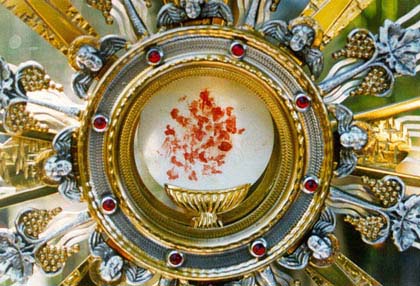 |
 |
This is My Body. This is My
Blood.
Matthew 26:26-28
In the morning a dew lay all about the camp,
and when the dew evaporated,
there on the surface of the desert
were fine flakes like hoar frost on the
ground.
On seeing it the Israelites asked one another, "What is this?"
For
they did not know what it was. But Moses told them,
"This is the bread which
the Lord has given you to eat."
Exodus 16:14-15
©
Written by Bob Stanley,
December 8, 1998, The Feast of the Immaculate Conception.
Updated May 25,
2005
![]() Back to Home Page...
Back to Home Page...